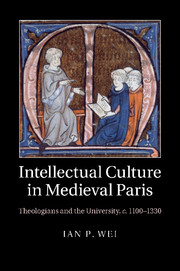Crossref Citations
This Book has been
cited by the following publications. This list is generated based on data provided by Crossref.
Verger, Jacques
2013.
Les universités au Moyen Age.
p.
217.
Welch, C.
2015.
Death and the erotic woman: the European gendering of mortality in times of major religious change.
Journal of Gender Studies,
Vol. 24,
Issue. 4,
p.
399.
Bergin, Joseph
2015.
A History of France.
p.
9.
Ray, Alison
2016.
Intellectual Exchange : English Users of the Paris Pecia System, 1250-1330.
Pecia,
Vol. 19,
Issue. ,
p.
7.
Dutilh Novaes, Catarina
and
Read, Stephen
2016.
The Cambridge Companion to Medieval Logic.
Kantasalmi, Kari
and
Holm, Gunilla
2017.
The State, Schooling and Identity.
p.
1.
Kiekens, Ine
2017.
A Heretic in Groenendaal? The Impact ofIn Agro Dominicoin the Low Countries in the Light ofVanden Twaelf Dogheden.
Medieval Mystical Theology,
Vol. 26,
Issue. 1,
p.
37.
Bubczyk, Robert
2018.
Familia Herlechini – motyw czarnych jeźdźców w kulturze średniowiecznego Zachodu (XI-XII w.), jego narodziny, znaczenie symboliczne i funkcje ideologicznze.
Studia Historyczne,
Vol. 61,
Issue. 2 (242),
p.
37.
Hames, Harvey J.
2018.
Kings and Conversion in the Thirteenth Century: Where Politics and Religion Meet?*.
Archives de sciences sociales des religions,
Vol. 182,
Issue. ,
p.
227.
Bengtsen, Søren S. E.
2018.
Encyclopedia of Educational Philosophy and Theory.
p.
1.
Marson Franchini, Antonio
2019.
Nicolas de Biard’s de festis model sermon collection: Preliminary study for an edition.
Pecia,
Vol. 22,
Issue. ,
p.
185.
Springer, Rebecca
2019.
Prelacy, Pastoral Care and the Instruction of Subordinates in Late Twelfth-Century England.
Studies in Church History,
Vol. 55,
Issue. ,
p.
114.
Morton, Jonathan
and
Nievergelt, Marco
2020.
The ‘Roman de la Rose' and Thirteenth-Century Thought.
Wei, Ian P.
2020.
Thinking about Animals in Thirteenth-Century Paris.
Carrillo, Raquel Rojo
2020.
Text, Liturgy, and Music in the Hispanic Rite.
Rubin, Miri
2020.
Cities of Strangers.
Kraebel, Andrew
2020.
Biblical Commentary and Translation in Later Medieval England.
Tkachenko, Rostislav
2020.
A system of methodological coordinates for a historiographer of medieval philosophy: a proposal of an explanatory tool.
Sententiae,
Vol. 39,
Issue. 2,
p.
8.
Rouillard, Linda Marie
2020.
Medieval Considerations of Incest, Marriage, and Penance.
p.
107.
Scholz, Roland W.
2020.
Transdisciplinarity: science for and with society in light of the university’s roles and functions.
Sustainability Science,
Vol. 15,
Issue. 4,
p.
1033.



